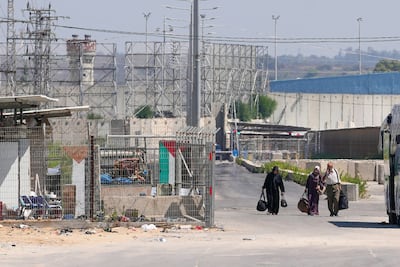Israeli authorities have closed the main crossing to the Gaza Strip following demonstrations on the border during which a 25-year-old Palestinian man was shot dead.
Nine others were wounded by Israeli gunfire a day after Israel closed the pedestrian crossing.
The closure will directly affect at least 18,000 Palestinians.
Protesters have gathered on the heavily militarised border for the past week, setting off improvised explosive devices and throwing debris at Israeli security forces manning the fence.
Last Thursday, five protesters were killed when an explosive device prematurely detonated during one of the demonstrations.
Anger has been rising among Hamas sympathisers in Gaza following a spike in bloodshed in the occupied West Bank in recent months, accompanied by Israeli army raids on occupied towns that have seen gun battles and scores of Palestinian civilians killed.
Israeli soldiers have gone after several Hamas militants during the raids. The group has controlled the densely populated enclave since 2007, when it won elections there following Israel’s 2005 withdrawal from the area.
It has recently been trying to expand its presence in the West Bank.

At the same time as the protests, large numbers of Jews are expected to visit Jerusalem's most sensitive holy site, known to Muslims as the Noble Sanctuary, this week for the holiday of Sukkot.
The compound, home to Al Aqsa Mosque, is often a focal point for violence.
Hamas says youths have organised the protests in response to Israeli provocations. The militant group cites an increase in visits by nationalist Jewish activists to the contested holy site.
“As long as these provocations continue, the protests will continue,” said Hamas spokesman Hazem Qasem.
Under long-standing arrangements, Jews are allowed to visit but not pray at the holy site. The large numbers of visits, along with scenes of some visitors quietly praying, have raised Palestinian fears that Israel is trying to divide or even take over the site.
The week's events recall a bloody protest campaign organised by Hamas in 2018 and 2019, during which more than 350 Palestinians were killed by Israeli fire.
Those protests halted after mediators, including Egypt, Qatar and the UN, brokered an unofficial deal in which Israel eased some economic restrictions on Gaza and allowed Qatar to deliver tens of millions of dollars in monthly payments for needy Gaza families and Hamas salaries.
In response to the latest protests, Israel closed the Erez crossing, the sole pedestrian passageway out of the enclave into Israel, to the roughly 18,000 Palestinians from Gaza who work in Israel.
Jobs in Israel are in great demand, paying up to 10 times as much as similar jobs in Gaza. Unemployment in the territory has hovered at close to 50 per cent.
Israel has begun to grant work permits in recent years to help maintain calm in Gaza. But Israeli officials say the permits are contingent on a quiet security situation.
Earlier this month, Israel briefly closed Gaza's main cargo crossing after saying it had discovered explosives in an outgoing shipment of clothing.
For Palestinians like Sami Al Amsi, head of the main labour union in Gaza, the latest closure means the loss of an economic lifeline.
“This is collective punishment,” he said.

